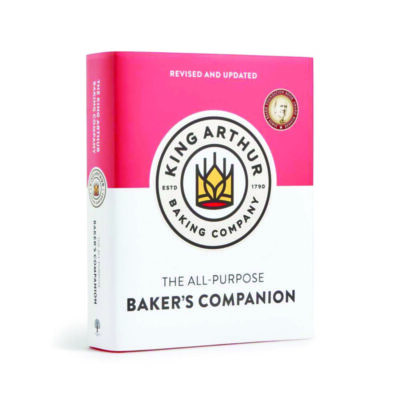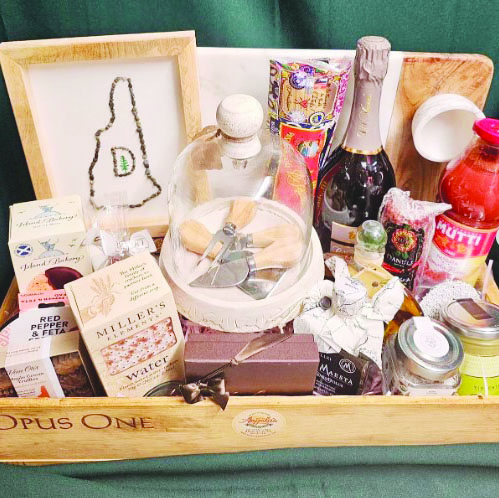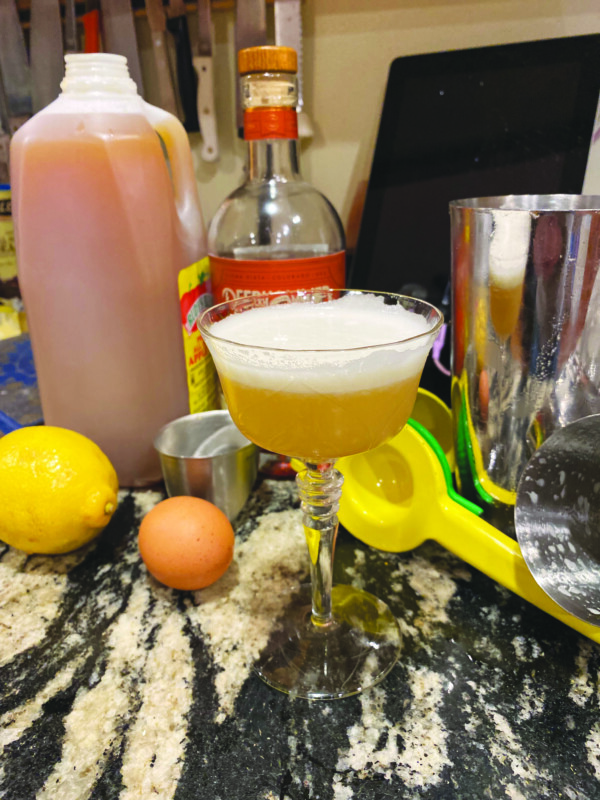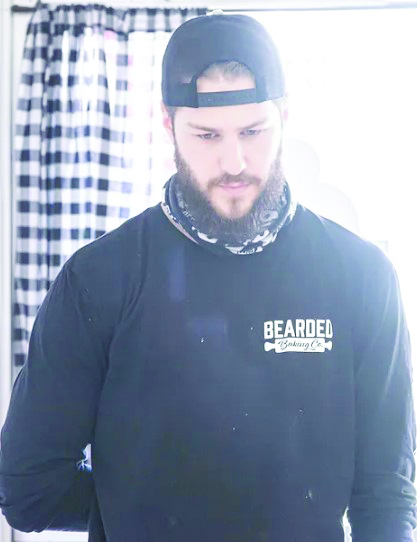Gifts for all budgets and levels of culinary nerdery
If you’ve been trying to think of a holiday gift for the cook, baker or mad scientist in your life, here are a few suggestions that you might not have thought of.
• Anova Sous Vide starting at $69.99 at anovaculinary.com. A sous vide is a fun toy for a kitchen gadget enthusiast. Originally designed for use in science labs, it keeps a water bath at a constant temperature, allowing a cook to bring a food to an exact temperature. If, for instance, you want to have a boiled egg with a yolk at just the right level of runniness, this will help you do it. If you want to pasteurize a particular food at an exact temperature, boom! Anova sous vides clamp onto the side of any deep vessel, like a soup pot, and are controlled via an app on your smartphone. Search for “sous vide” on YouTube, and you will be hooked.
• Victorinox Swiss Classic 8-Inch Chef’s Knife with Straight-Edge Blade and Black Handle $61 at victorinox.com.The best, most useful tool in any kitchen is a sharp, high-quality chef’s knife. Watch any non-baking cooking competition, and most of the contestants will make a bit of a production of unrolling their canvas knife carrier. Victorinox is the company that makes Swiss Army Knives, and this is their beginner’s kitchen knife that is perfect for culinary students and 98 percent of the rest of us. It is comfortable in the hand, holds an edge well, and chops, cuts and slices like a dream. Send it out to be sharpened two or three times per year, and the cook on your list will be 15 to 18 percent happier in the kitchen.

• Apron. A good apron is a necessity in any kitchen and probably gives a cook the most latitude for self-expression. There are classics, like a solid or pinstriped professional apron available from any restaurant supply store, or the iconic “Kiss the Cook” apron. You can easily find aprons designed to reflect any personality, from the NRA to NPR, from a favorite sports team to obscure anime characters. Personally, I love my shop apron, originally designed for woodworkers; it is made from sturdy canvas and has more pockets than any one cook is likely to need.
• Bar tools about $25 online or from a restaurant supply store. Almost any chef will tell you to buy your pots and pans or knives individually, rather than in a set, so you get exactly the tools you need and very few of the ones that will sit around cluttering up your cabinet. If you are shopping for someone looking to learn how to mix drinks, there are four basic tools that will allow them to make virtually any cocktail: a Boston shaker (a two-part big cup and little cup for shaking drinks with ice), a long-handled bar spoon for drinks like martinis that shouldn’t be shaken, a small strainer (I like a simple $3 mesh drain strainer; it fits well over almost any glass) and a hand-held citrus juicer. Any of these will make good stocking stuffers, or as a set, with a bottle of liquor, they will be an excellent wrapped present.
• The Flavor Bible: The Essential Guide to Culinary Creativity, Based on the Wisdom of America’s Most Imaginative Chefs by Karen Page and Andrew Dornenburg (2008, Little, Brown and Co.) hardcover $45. This reference book is the authoritative guide to pairing flavors with each other. It is perfect for the cook in your life who enjoys developing their own recipes.

• The All-Purpose Baker’s Companion by King Arthur Baking Co. (2021, Countryman Press) hardcover $40. Cooking is fun, because most of the time you can throw things together on a whim and see how they work together (especially if you own a copy of The Flavor Bible). Baking can be intimidating, because recipes need to be exact to achieve the chemical reactions needed to produce proper cookies, cakes and breads. Every recipe in this book has been rigorously tested by the staff at King Arthur. There are chapters devoted to technique, and the science of baking, and useful, easy to understand charts and descriptions of tools and ingredients.
• Cast-iron Dutch oven starting at $34.95 at lodgecastiron.com. A cast-iron Dutch oven is the Swiss army knife of kitchen pots. It is perfect for braising a pork shoulder, deep-frying corn fritters or baking a loaf of sourdough bread. Many cooks prefer Dutch ovens that have been coated with enamel, but properly seasoned, a plain iron one will give several generations’ worth of service. Lodge is the go-to for cast-iron cookware. You could easily spend $400 or more for a French, enameled Dutch oven and worry about damaging it, or you can spend less than $100 for a no-nonsense one that you can break out the same morning you unwrap it.
• An expensive, over-the-top kitchen gift: A KitchenAid Stand Mixer starting at $249 at KitchenAid.com. A KitchenAid mixer is the gold standard of kitchen tools. It will probably work perfectly for 30 years or more, and if it ever does break down KitchenAid will happily repair it, often under warranty. They are available in a range of colors and sizes, and a short search online will reveal an infinite number of decals to personalize your mixer. This is a solid investment. KitchenAid sells reconditioned mixers for as little as $200, and you can find them for even less at flea markets. Because of their sterling reputation, an old used KitchenAid carries as much cachet as a new one, maybe more.
• A completely ridiculously expensive holiday kitchen gift: A Reconditioned Taylor Commercial Soft-Serve Ice Cream Machine with Three-Flavor and Twist Capability $8,995 at New Hampshire Restaurant Equipment (783 Second St., Manchester, nhrestequip.com). Is it ridiculous to spend $9,000 on a soft-serve machine? That depends. Is it more ridiculous than parking a new car with one of those giant red bows on it in your driveway? If you want a perfect, once-in-a-lifetime present for the soft-serve extremist in your life, this is it. When other parents are bringing trays of brownies to a PTA fundraiser, your newly retired father will be selling his patented mango-fudge ripple ice cream and slipping freebies to kids when their parents aren’t looking.
Looking to give a cookbook? Here are a few standout recent releases.
• America’s Test Kitchen 25: 500 Recipes That Change the Way America Cooks (2024, America’s Test Kitchen) This book feels like it could be a winner with kitchen novices and your family’s best cook — you get cast Q&As and discussions of some dishes as well as “why it works” explanations and thorough methods for every dish.
• Bake Club, 101 Must-Have Moves for Your Kitchen by Christina Tosi and Shannon Salzano (2024, Alfred A. Knopf) Tosi, of Milk Bar fame, is a fun baker who makes fun things — in this book that includes Ice Cream Loaf Cake, Cinnamon Buns with Brown Sugar Goo and Pop Rocks.
• Easy Weeknight Dinners from New York Times Cooking by Emily Weinstein (2024, Ten Speed Press) The New York Times Cooking recipes are almost as sure-bet as America’s Test Kitchen; the pico de gallo (made to go with hot dogs) is already one of my go-tos.
• Pan Y Dulce, The Latin American Baking Book By Bryan Ford (2024, Voracious Books) Even breads and desserts that seem specific to one country or region — a Chilean bread, a Mexican cookie — have history that weaves together native ingredients and methods, colonial influences and often origins even beyond Spain or Portugal, as Ford explains.
• My Mexican Kitchen by Eva Longoira (2024 Clarkson Potter) Taking the Stanley-Tucci-in-Italyapproach to food in Mexico on her CNN show, Eva Longoria has become one of my favorite aspirational food exploration people, both on her show and in her podcast, Hungry for History.
• Turkaz Kitchen, Traditional & Modern Dough Recipes for Sweet & Savory Bakers by Betül Tunç (2024, Ten Speed Press) Tunç gained a following for her bakes on Instagram but what grabbed me about the book was that it both offers Turkish bakes (Turkish Pistachio Baklava, the sesame and molasses coated Simit) and things like Raspberry Key Lime Bars, Beef Empanadas with Salsa Roja and Salsa Verde, and Garlic Naan.
• What Goes with What: 100 Recipes, 20 Charts, Endless Possibilitiesby Julia Turshen (2024, Flatiron Books) On their own, this book’s charts are a valuable resource, breaking down something like a sandwich into its parts — bread, main thing, creamy layer, crunchy layer and extra acidic thing — and then giving suggestions for what each thing could be used to create, for example “Best Ham Sandwich.” We get her recipes to go with these charts.
• When Southern Women Cook edited by Morgan Bolling (2024, America’s Test Kitchen) You normally don’t read cookbooks cover to cover but this book, as much a history book as a cookbook, is an exception. You get the stories of a dish, and its many variations, and ingredients and their connections to Native, African, Latin, European and Asian cultures and specific women who had a hand in popularizing the foods. — Amy Diaz





